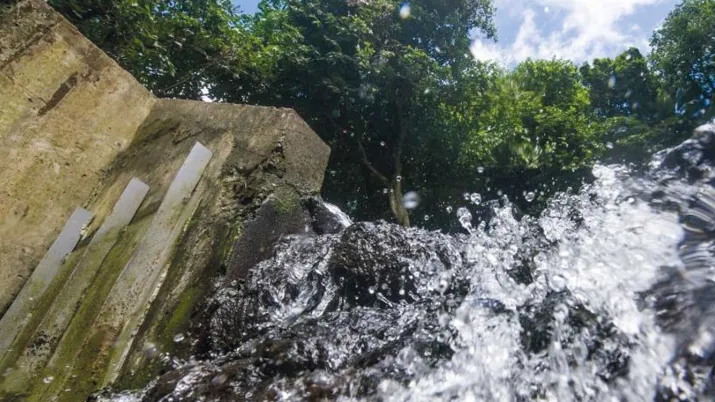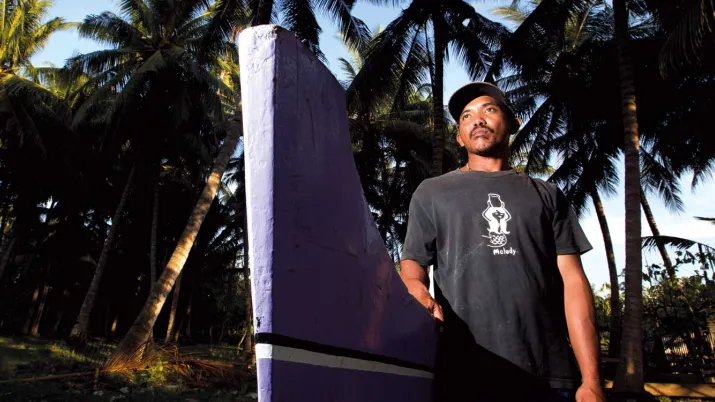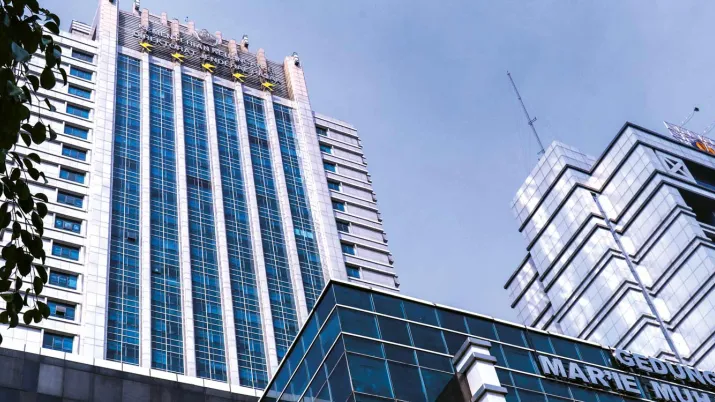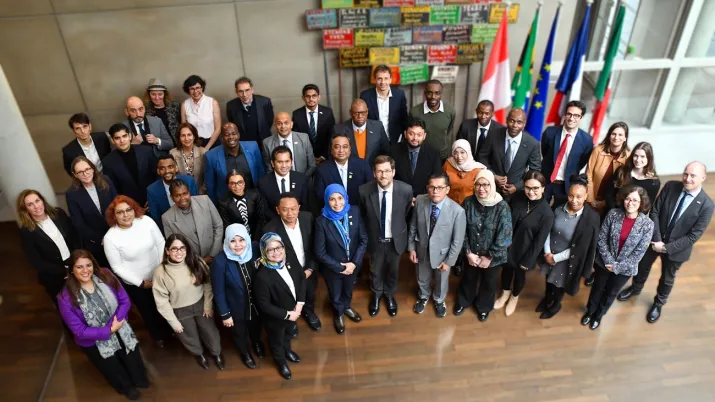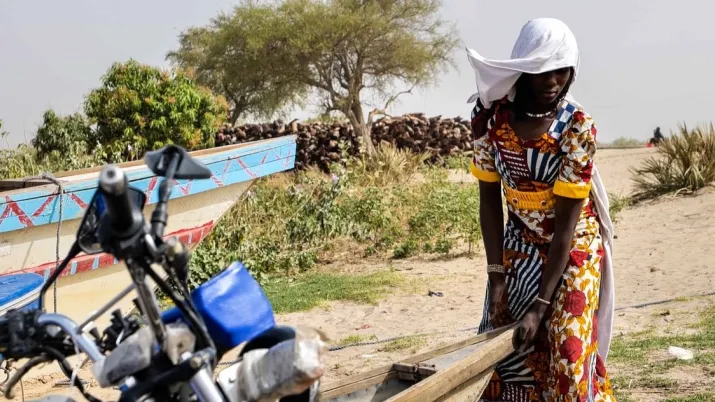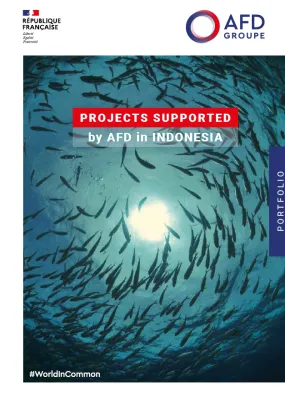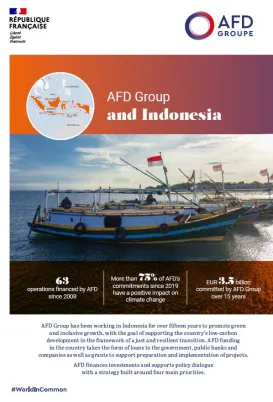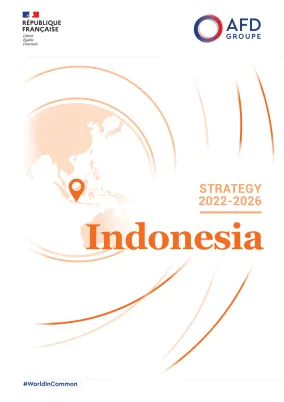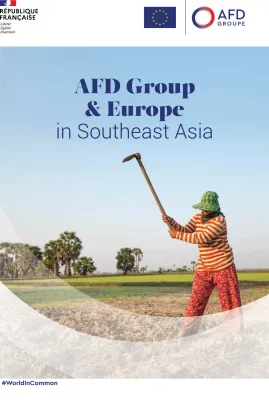Share the page
Indonesia
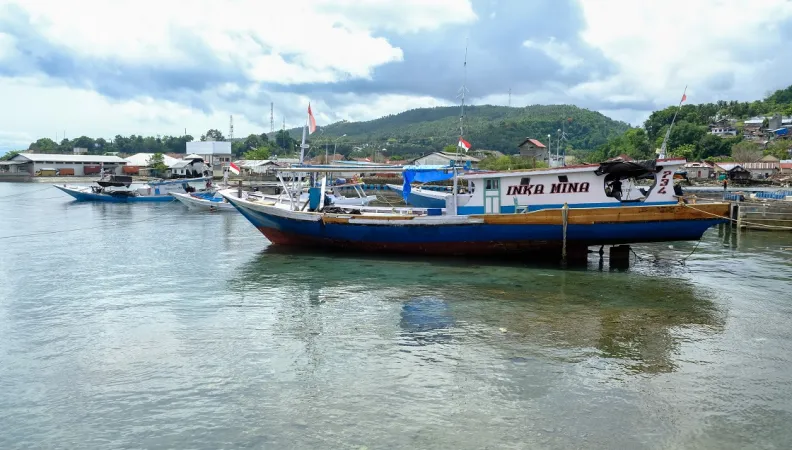
AFD Group has been working in Indonesia for more than 15 years to promote green and inclusive growth, with the aim of supporting the country’s low-carbon development within the context of a just and resilient transition. AFD financing in Indonesia takes the form of loans to the government, public banks, and companies, as well as of grants to support project preparation and implementation. AFD finances investments and supports public policy dialog through a strategy based on four main priorities.
Context
With its 108,000 km of tropical sea coastline and more than 17,500 islands, Indonesia is the largest archipelago in the world, making it one of the areas richest in marine and land biodiversity. Its geographical location also makes it one of the countries most exposed to natural disasters (earthquakes, tsunamis, volcanic eruptions, etc.) and the impacts of climate change (higher temperatures, rising sea levels, and floods).
Indonesia’s economy is ranked top in Southeast Asia and 16th worldwide.
The country, which is a member of the G20, has shown continuous economic growth since the Asian crisis of 1997 and the democratization of the regime in 1998. This growth, combined with a tripling of the population in 60 years, has created opportunities as well as significant challenges that include a growing demand for energy and transport, rapid urbanization, overexploitation of natural resources, and environmental pollution.
In line with these challenges and Indonesia’s sustainable development priorities, AFD is supporting the country in its low-carbon development as part of a just and resilient transition.
The AFD field office in Jakarta, opened in 2007, is attached to the Southeast Asia Regional Office based in Bangkok.
Our approach
AFD and Indonesia: supporting a low-carbon, fair and resilient transition
Indonesia, whose population will soon surpass 280 million, has the largest economy in Southeast Asia and the 16th largest in the world. It has targeted the extraction and use of fossil fuels to boost its economic growth. However, at COP26 in 2021, Indonesia announced its goal of achieving carbon neutrality by 2060.
During its presidency of the G20 summit in 2022, Indonesia made the energy transition one of its top priorities. Its commitment also took the form of a joint declaration on the Just Energy Transition Partnership (JETP) with several countries, including France. To achieve the ambitious decarbonization objectives set out in the JETP, large-scale public and private investments are needed in renewable energies (e.g., geothermal, solar, wind, hydro, and bioenergy), transmission and distribution networks, and energy efficiency (for buildings and transport).
To support the Just Energy Transition in Indonesia, AFD finances investments and reforms in renewable energy, smart grids, and energy efficiency. This takes the form of public policy loans, investment loans and technical assistance to the Indonesian government, public companies including the state electricity company PLN, and credit lines dedicated to local banks that support private or public green investments.
Proparco, AFD Group’s private-sector subsidiary, is also involved in Indonesia, where it works for renewable energy solutions such as solar and floating-solar power, ending diesel use, geothermal energy, and wind power. This support includes senior bank loans, investments in private equity funds, credit lines and guarantee tools.
Indonesia is the largest archipelago in the world. Its huge maritime territory is made up of more than 17,000 islands and is probably the Earth’s largest reservoir of marine and forest biodiversity. Indonesian waters generate income worth several billion dollars per year thanks to fishing, aquaculture, transport, and tourism. However, these resources are vulnerable to illegal fishing, climate change, pollution, and coastal deforestation.
AFD promotes the blue economy in Indonesia by helping with public investments in fishing ports and in natural resource management and research, which covers sustainable fishing, oceanography, marine meteorology, the fight against plastic pollution, marine protected areas, and mangrove conservation. To this end, AFD provides support to the Ministry of Maritime Affairs and Fisheries and its entities, as well as national agencies such as the National Research and Innovation Agency (BRIN) and the Meteorological, Climatological and Geophysical Agency (BMKG).
With nearly 55% of Indonesia’s population living in urban areas, it is crucial to develop infrastructure and public services in order to cope with rapid urbanization and regional inequalities.
AFD supports Indonesia by helping to finance sustainable infrastructure and capacity-building initiatives for the institutions responsible for managing them. For needs in urban mobility and that sector’s contribution to greenhouse gas emissions, AFD places priority on implementing integrated and inclusive urban transportation projects, as well as on strengthening local resilience to natural disasters. In this field, AFD is actively involved in promoting sustainable urban mobility plans and bus rapid transit (BRT) systems in the provinces of North Sumatra and West Java.
Through credit lines for public banks, AFD has furthered the development of other urban services, such as water supply in the province of East Java.
The financial system plays a key role in financing the energy transition and low-carbon infrastructure. AFD promotes a financial transition that encourages capital allocation in accordance with the Paris Agreement and that contributes to managing the climate risks that threaten the financial system.
AFD supports local public banks (such as PT SMI and others) via credit lines and technical assistance to improve their internal practices and procedures or to encourage the incorporation of climate risks into their operations. French and European experience in tax and budgetary reforms, as well as climate-related public finance (green budget, carbon tax, etc.), can be mobilized by Expertise France, the AFD Group subsidiary in charge of international technical cooperation. AFD also collaborates with other donors as part of public policy dialog.
In addition, AFD supports public companies through direct financing and grants to ensure their financial stability as part of inclusive and sustainable development supported by the government.
In the field
Projects
News & Press Releases
AFD Group brings together three major emerging economies to accelerate the energy transition
Published on December 30, 2025
AFD and PLN strengthen their cooperation to accelerate Indonesia’s energy transition
Published on December 8, 2025
Publications & Media
Key figures
-
€3.5 billion committed by AFD Group in the past 15 years
-
63 AFD-financed operations since 2008
-
More than 75% of AFD’s commitments since 2019 have a positive impact on climate change

